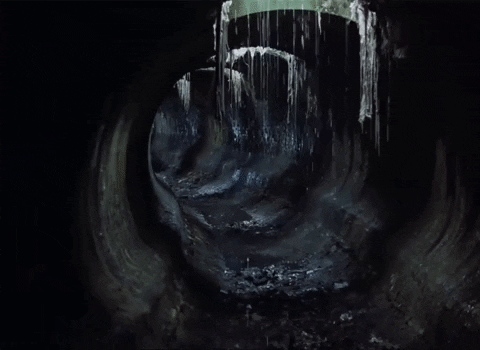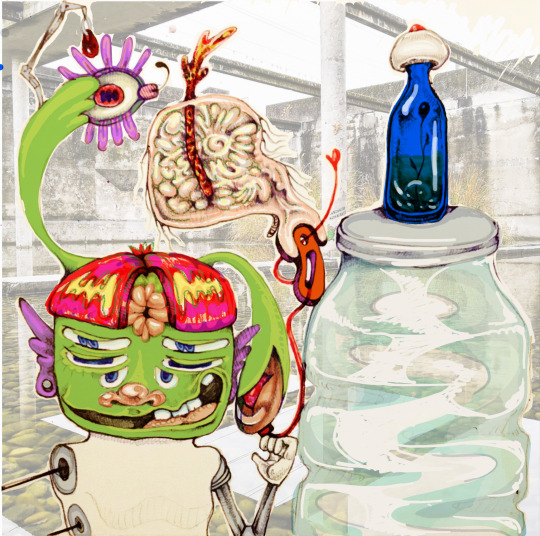#Wastewater
Explore tagged Tumblr posts
Text
Living machines are essentially intensive, indoor artificial wetlands. Technical names for living machines include "advanced ecologically engineered systems" and "fixed-film ecology wastewater treatment systems." What they entail is mimicking natural processes of biological decomposition in a constructed aquatic environment. Simply put: dirty water goes in, passes through a series of self-contained aquatic ecosystems, and clean water comes out. The water is, in fact, so clean that it can be safely discharged into sensitive aquatic environments, like natural wetlands. And it does all of this without any of the usual chemical treatments or high-energy inputs of conventional wastewater treatment. Living machines produce such safe effluent because they achieve what is known as "tertiary treatment," meaning they successfully abate pollutants. How does a biological system do this? Simple: it uses them as inputs. Let me explain. The most common such pollutants are nitrogen and phosphorous. These happen to be the two nutrients whose out-of-whack flows have pushed us past a key planetary boundary. The biggest reason for this is industrial agriculture: it relies on synthetic nitrogen and mined phosphorous to exceed the carrying capacity of the ecosystems in which it operates. One of the big problems with industrial agriculture is that a great deal of the nitrogen and phosphorous applied isn't actually utilized by the food being produced: most of it runs off into waterways. This leads to far-reaching, ecologically catastrophic events ("eutrophication"). By constructing a complete food chain within the living machine, each step creates the food for the next step. Excess nutrients, like nitrogen and phosphorous, feed microorganisms which are then consumed by larger creatures and so on up the food chain, until we are left with harmless components and a great deal of life. The living machine converts pollution into biodiversity and clean water, instead of run-off and eutrophication. It's a prime example of true "regeneration."
188 notes
·
View notes
Photo

#Сталкер#Stalker#1979#Andrei Tarkovsky#tunnel#Soviet science fiction art film#70's#70s#urbex#sewage#wastewater#my gif#gif#my edit
2K notes
·
View notes
Text
(4) Dr. Lucky Tran: "Here's a useful table that you can use to estimate real world COVID risk from Biobot wastewater data:"

60 notes
·
View notes
Text
Indian IT Worker Designs New Eco-Friendly Sewage Treatment Method with the Sacred Cow as His Inspiration https://www.goodnewsnetwork.org/indian-it-worker-designs-new-eco-friendly-sewage-treatment-method-with-the-sacred-cow-as-his-inspiration/
Tharun Kumar began to imagine ways to build a better sewage treatment method that could produce good quality water without chemicals.
In 2017, Kumar started ECOSTP with the chambered stomach of the cow as his “bovine inspiration.”
Typical wastewater plants use aerobic bacteria, or metabolism with oxygen, to break down sewage, but this requires the ventilation system that continually runs on energy. Regular sewage treatment also tends to use chemicals, and has the presence of a full-time employee. Kumar has eliminated almost all of these drawbacks.
At the base of the ECOSTP septic tank is a layer of cow dung that provides the bacterial workers. With the water moving via gravity, it enters the second bacterial chamber before passing into the third space which is a filter of sand and gravel. The fourth chamber lies under a garden of select vascular plants which removes suspended solids, pathogens, nitrogen, and phosphorus, the latter two going to feed the plants.
The resulting water is graded by health inspectors as good quality for toilet water and gardening applications. With the aid of a grant from the US-based Biomimicry Solutions, ECOSTP now has 325 clients across 22 states in India, and their septic tanks are unmanned and unpowered, saving thousands in running costs.
“We are proud to have reclaimed 2 billion liters of sewage so far without power or chemicals.”
ECOSTP is now seeing if it’s possible to identify anaerobic bacteria that can remove the harmful compounds of industrial effluent.
youtube
#good news#science#microbiology#india#waste water treatment#wastewater#green technology#biomimicry#environmentalism#environment#nature#animals#climate change#climate crisis#Youtube
255 notes
·
View notes
Text
Phillips 66 Is Accused of Violating the Clean Water Act. (New York Times)
Excerpt from this New York Times story:
A federal grand jury on Wednesday indicted Phillips 66 on charges of violating the Clean Water Act by dumping nearly 800,000 gallons of contaminated wastewater into the Los Angeles County sewer system and failing to report the incident to authorities.
The Houston-based oil company was charged with releasing wastewater that contained excessive amounts of oil and grease from a refinery in Carson, Calif., in 2020 and 2021, the Justice Department said Thursday.
“Protecting our environment is key to protecting our community,” Martin Estrada, the U.S. attorney for the Central District of California, said in a statement. “Just like the rest of us, corporations have a duty to follow the law, so when companies contaminate, they must be held accountable.”
The Justice Department charged Phillips 66 with two counts of negligently violating the Clean Water Act and four counts of knowingly violating the act. The company faces up to five years of probation on each count and a maximum of $2.4 million in fines.
The Justice Department accused Phillips 66 of discharging contaminated wastewater on two occasions.
For over two and half hours on Nov. 24, 2020, the indictment said, the Carson oil refinery released 310,000 gallons of wastewater containing about 64,000 pounds of oil and grease. The oil-and-grease concentration of the water was about 300 times the amount allowed under the company’s permit.
On Feb. 8, 2021, the facility discharged 480,000 gallons of wastewater containing about 33,700 pounds of oil and grease over five and a half hours, the indictment said.
Mr. Estrada said on a call with reporters that investigators believed that the Los Angeles County wastewater treatment plant was able to capture all of the contaminated water before it was released, like most treated water, into the Pacific Ocean.
26 notes
·
View notes
Text
I need my black and brown women girls around the world to start masking when you can. It's imperative you get back into the habit of this. Our pains are already "our fault" and we've been anxiety-ed and lose weight-ed to death already. We already bear the brunt of unpaid labour and emotional care. It is hard to fight against the female socialization that they've ingrained in us to make us pliable but you must try. Unfortunately most of my resources are from the Global North but the research is clear at least.
Please translate where you can for your sisters. I only know this one language.
There are scientists tracking waste water. Check how many times illnesses are mention in your newspapers.
14 notes
·
View notes
Text
Sometimes, even sewer infrastructure can be pretty, especially when it's in a pretty place.

Supai Village Sewage Lagoon, Grand Canyon, AZ, USA
Photo by: Civil Otterneer
12 notes
·
View notes
Text
The scientific case for wastewater surveillance is straightforward: While most people who get sick don’t go to the doctor, they do go to the bathroom. In doing so they release genetic debris from viruses and other infectious agents that reveal what strains are in circulation.
Compared with clinical testing, the method is non-invasive and unbiased, offering timely data on disease dynamics that would be impossible to obtain from reported cases alone. And while the Ontario-wide program continues to function as a COVID-19 surveillance measure, it has also been used to track mpox, RSV and flu, with the capacity to quickly pivot to other pathogens as needed.
If there is a scientific case for cancelling the initiative, the province has not made it.
#ontario#fuck the cdc#canpol#canada#wastewater#human rights#abled supremacy#mask up; fight covid eugenics#eugenics#canada practices eugenics
14 notes
·
View notes
Text
Elon Musk's Boring Company wants to dump 142,500 gallons of wastewater A DAY directly into the Colorado River and onto 63 acres of grassland via irrigation
Space Karen’s company, Gapped Bass LLC, applied for this controversial permit and it went to public meeting this week
My vote is Elon for the upcoming Ides of March sacrifice
#elon musk#muskrat#elongated muskrat#enviromental#environment#conservation#wastewater#politics#Caesar#the ides of march#ides of march#julius caesar#march 15th#march 15#beware the ides of march#polluters#polluted water#protect our wildlife#protect our earth#waterways#environmental issues#environmental pollution#environmentalism#space karen#fuck elon musk#fuck elon#elon musty#elongated man#brutus#ancient rome
180 notes
·
View notes
Text
3 notes
·
View notes
Text
Biobot's Wastewater Data and Wastewater Intelligence Platform
10 notes
·
View notes
Text
Amid the growing threats of climate crisis and habitat fragmentation, constructed wetlands are gaining popularity as natural water-cleaning systems.
#wetlands#florida#good news#environmentalism#nature#environment#water#wastewater#wastewater treatment
31 notes
·
View notes
Text
PSA. Lots of great charts and data. You're welcome
2 notes
·
View notes
Text

Dear Gus & Magnus,
I didn't take a picture today, but Bryan took this one while we were filming Juliana at the Denver Metro Water Reclamation plant. I'm holding the boom pole. It was windy as all hell.
Dad.
Denver, Colorado. 6.27.2023 - 10.00am-ish.
#darla yarbrough#guy choate#juliana porras-mendoza#will scott#film crew#denver metro water reclamation#wastewater treatment plant#wastewater#garver video team#video team
3 notes
·
View notes
Text
Ontario dropped wastewater testing early, with no plan for feds to step in
Ontario ended its wastewater testing program earlier than planned this summer, despite having funding in place until the end of September.
Ottawa Citizen
3 notes
·
View notes
Text

Wastewater friends...........
2 notes
·
View notes